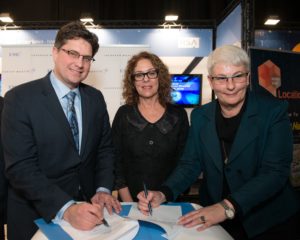
EMC, IBM and Lockheed Martin in Silicon Wadi
EMC, IBM and Lockheed Martin in Silicon Wadi
February 5, 2014
Homeland & Cyber Security, Robotics & High-Tech
JNS — Lockheed Martin and EMC Corporation announced plans to collaborate on projects as part of Israel’s national cyber security project, “CyberSpark.” Simultaneously, IBM announced the establishment of a Center of Excellence for Security and Protection of Infrastructure and Assets to be established in the Alon Building for Hi-Tech at Ben-Gurion University of the Negev (BGU).
CyberSpark is the integration of academia, business and government. The crux of the project is the synergy between BGU and the newly established Advanced Technologies Park (ATP) that is adjacent to the University’s Marcus Family Campus in Beer-Sheva.

Lockheed Martin and EMC executives sign agreement to fund collaborative research at CyberSpark as BGU President Prof. Rivka Carmi looks on.
Under the arrangement, Lockheed Martin and EMC will identify a series of development opportunities that can be contracted to BGU researchers and other experts in the field. Local talent supporting projects in cloud computing, data analytics and related cyber security technologies will commit to regular project reviews and scheduled deliverables in their efforts to develop next-generation EMC and Lockheed Martin capabilities.
“We look at Israel and we see a truly equal partner. It’s the capabilities they have, the understanding of the cyber threats and the ability — through the innovation available in the Israeli culture and workforce — to be able to develop the world’s leading cutting-edge projects,” said Robert Eastman, defense and intelligence solutions vice president for Lockheed Martin.
“Israel’s entrepreneurial and academic communities offer a unique combination of talent, innovation and pioneering spirit,” remarked Dr. Orna Berry, vice president and general manager of EMC’s Israel Center for Excellence. EMC expects its activity in Beer-Sheva to expand considerably, and was one of the first tenants to take up residence in the ATP.
The groundwork for CyberSpark was laid over the past decade, according to Prof. Dan Blumberg, head of the Homeland Security Institute at BGU. He said this southern success story begins in 2004.
“Back then, Deutsche Telekom … was looking at investing in securing data that would be transferred over cellular phones in the future. [The company] ended up investing in and opening up a research center at BGU that would focus on data security, which led to an agreement in 2006 where ‘T-Labs’ [Telekom Innovation Laboratories] were opened at BGU.”
Those labs led to a new group of BGU researchers focused on cyber security and then to the first-of-its-kind master’s program in cyberspace security.
In addition to the establishment of the ATP, the Israeli government made the decision to move most of the IT units of the IDF to the south.
“We are in a very good position,” Blumberg told JNS.org, noting that the expansion of the ATP and the new investments in what will be a center of excellence in cyber security will generate jobs in the south and keep graduating students in the area.
“In LA you have Silicon Valley. In Berlin, Silicon Allee. In Beer-Sheva, you will have Silicon Wadi,” said Blumberg.
In addition, a representative of the Maryland-Israel Development Center, Peter Telem, has taken a tour of the ATP, and has begun meetings with BGU to further cooperation. Maryland is looking to become the epicenter of cyber technology in the United States.



